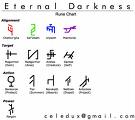One of my next projects will be an article comparing the magic systems of various games, both conceptually and in terms of their underlying quantitative mechanics, as one example of how interactive symbolism can be programmed. As readers of Quests know, I regard programming as a form of procedural, interactive writing, which unfolds according to a set of rules that both constrain and facilitate player actions and interpretations. For example, the magic systems of role-playing games (tabletop, single-player, and MMO) comprise rigorous, quantitative rules for altering the physical and sometimes mental reality of a particular game world. Because these systems often involve glyphs, runes, and incantations, there are opportunities to encode meaning into a core game mechanic, as in the tabletop game Mage: The Awakening or the elaborate cosmology of Eternal Darkness.
Questions for research include:
- How have different table-top RPG’s, CRPG’S, action-adventure games, and MMO’s implemented magic systems?
- What are the origins of magic systems in fantasy novels? For example, the convention of having magic users memorize spells that are then erased from their memory after being cast derives from Fritz Leiber, but not from Tolkien (who eschewed direct references to the concept of magic in his work).
- What is the relationship between game systems of magic and real occultist systems? (This treads on difficult ground, because of many gamers’ understandable discomfort with the association by fundamentalists of Dungeons and Dragons with black magic. However, Gary Gygax himself encouraged dungeon masters to consult encyclopedias of the occult as reference works, and Silicon Knights did thorough research into actual historical arcane systems in order to build the elaborate spell-casting system of Eternal Darkness. The table-top role-playing systems Nephilim and Mage: The Awakening both embrace mystical lore as metaphors explored through their game mechanics.)
- Most importantly, as relates to programming practice:
- How did the World of Darkness mod (WoDMod) script the magic system of the Mage tabletop game into Vampire: The Masquerade Redemption?
- How do custom NWN scripters make their own spells?
- How could we as designers learn from past design of magic systems in order to make our own games’ magic systems both more fun and metaphorically resonant, so that we invest this aspect of fantasy with all its potential for symbolism rather than reducing it to the glitz and glamor of flashy visual effects without substance?

You should look into the Betrayal at Krondor game for some insight into this… the novels it is based on focus a lot on the magic systems in the world of Midkemia (understandably, since the first 2 books are entitled “Magician” and the main character is a failed magical apprentice who learns more and more about the fundamentals of magic throughout the series). Some of this coolness bleeds through in the magic system of the game, though in a much less mature way. I seem to remember that the spells had different levels of complexity, based on the number of points in a diagram it took to communicate the spell spatially, and many of them were lore-based, such as the Mad Gods’ Rage spell that somehow referenced the celestial armageddon from the world’s mythology. Anyway, they were at least more complex than Final Fantasy’s “fire, fira firaga.”
Andrew Doull has made a series of articles (15 at last count) exploring the magic systems used in Roguelike games. The articles touch on the developer side of things fairly heavily.
Jeff, I think there’s probably much more material on magic systems than just a single article’s worth: e.g. a book form. Drop me a line if you want a further discussion on the subject.
Incredible. This is a wonderful website, please keep up the excellent work!